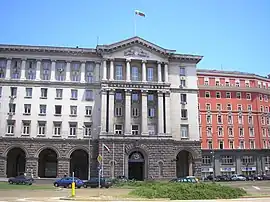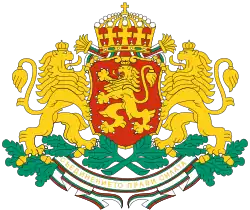Government of Bulgaria
The Council of Ministers (Bulgarian: Министерски съвет, Ministerski savet) is the main authority of the executive power in the Republic of Bulgaria. It consists of the Prime Minister of Bulgaria and all the specialized ministers.[1]
| Government of Bulgaria | |
|---|---|
| Министерски съвет | |
| Overview | |
| Established | 5 July 1879 |
| State | Bulgaria |
| Leader | Prime Minister of Bulgaria |
| Appointed by | National Assembly of Bulgaria |
| Responsible to | National Assembly of Bulgaria |
| Headquarters | The Largo, Sofia |
| Website | https://www.government.bg/en |

 |
|---|
Overview
After the composition of the Council of Ministers is decided by the newly elected government, the members of parliament who are chosen to become ministers temporarily lose their parliamentary rights while being ministers. These rights are restored in case they are released from the Council of Ministers or the government falls from power. This is in contrast to how deputy ministers and other government officials are treated when they are elected as deputies.
Sometimes, with the purpose of preserving the political representation of different parties or groups in the Council of Ministers, one or more ministers without portfolio (lacking a ministry of own) may be appointed.
The Council of Ministers office is in central Sofia and is part of the Largo architectural ensemble.
Structure of the Cabinet
The Denkov Government is the 102nd and current cabinet of Bulgaria. It was approved by the parliament on 6 June 2023, and is a majority coalition of GERB and PP–DB.[2][3][4][5] Per the coalition agreement, it is set to be a rotation government, where PP–DB's Nikolai Denkov would start with the premiership, with GERB's Mariya Gabriel serving as Deputy Prime Minister, and after nine months, the two would switch positions.[6][7]
| Portfolio | Minister | Took office | Left office | Party | |
|---|---|---|---|---|---|
| Prime Minister | 6 June 2023 | Incumbent | PP–DB | ||
| Deputy Prime Minister for EU funds Minister of Foreign Affairs | 6 June 2023 | Incumbent | GERB—SDS | ||
| Minister of Finance | 6 June 2023 | Incumbent | PP–DB | ||
| Minister of Internal Affairs | Kalin Stoyanov | 6 June 2023 | Incumbent | Independent | |
| Minister of Regional Development and Public Works | Andrey Tsekov | 6 June 2023 | Incumbent | PP–DB | |
| Minister of Labour and Social Policy | Ivanka Shalapatova | 6 June 2023 | Incumbent | Independent | |
| Defence Minister | 6 June 2023 | Incumbent | Independent | ||
| Minister of Justice | Atanas Slavov | 6 June 2023 | Incumbent | PP–DB | |
| Minister of Education and Science | Galin Tsokov | 6 June 2023 | Incumbent | Independent | |
| Minister of Health | Hristo Hinkov | 6 June 2023 | Incumbent | Independent | |
| Minister of Culture | Krastyu Krastev | 6 June 2023 | Incumbent | Independent | |
| Minister of Environment and Waters | 6 June 2023 | Incumbent | Independent | ||
| Minister of Agriculture | Kiril Marinov Vatev | 6 June 2023 | Incumbent | Independent | |
| Minister of Transport and Communications | Georgi Gvozdeikov | 6 June 2023 | Incumbent | PP–DB | |
| Minister of Economy | Bogdan Bogdanov | 6 June 2023 | Incumbent | Independent | |
| Minister of Innovation and Growth | Milena Stoycheva | 6 June 2023 | Incumbent | Independent | |
| Minister of Energy | Rumen Radev | 6 June 2023 | Incumbent | Independent | |
| Minister of e-Government | Alexander Yolovski | 6 June 2023 | Incumbent | Independent | |
| Minister of Tourism | Zaritsa Dinkova | 6 June 2023 | Incumbent | PP–DB | |
| Minister of Youth and Sport | Dimitar Iliev | 6 June 2023 | Incumbent | PP–DB | |
References
- "government.bg".
- "Bulgaria's National Assembly elects Denkov government". The Sofia Globe. 6 June 2023. Retrieved 6 June 2023.
- "The New Prime Minister of Bulgaria: Who is Nikolay Denkov?". Novinite. Retrieved 6 June 2023.
- "Bulgaria Finally has a Regular Government (CHRONOLOGY OF EVENTS)". Novinite. Retrieved 6 June 2023.
- "Who's Who in Proposed Government Lineup". Bulgarian News Agency. Retrieved 6 June 2023.
- "ГЕРБ и ПП-ДБ правят правителство, Денков и Габриел ще са премиери за по 9 месеца (видео)". Mediapool.bg (in Bulgarian). 22 May 2023. Retrieved 24 May 2023.
- "ГЕРБ и новата коалиция тръгват заедно към втория мандат със заявка за кабинет с ротационен премиер". Dnevnik (in Bulgarian). 22 May 2023. Retrieved 24 May 2023.
External links
- Council of Ministers official website (in English) Archived 28 February 2009 at the Wayback Machine (in Bulgarian) Archived 10 February 2011 at the Wayback Machine